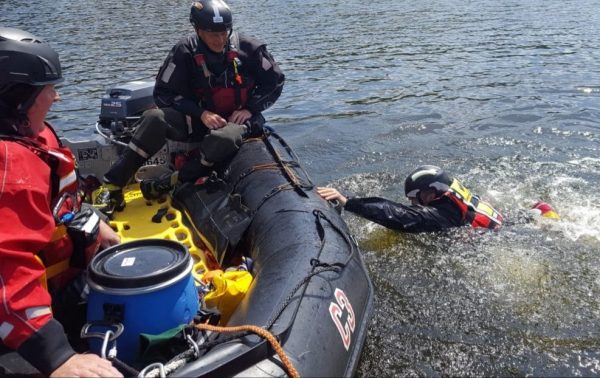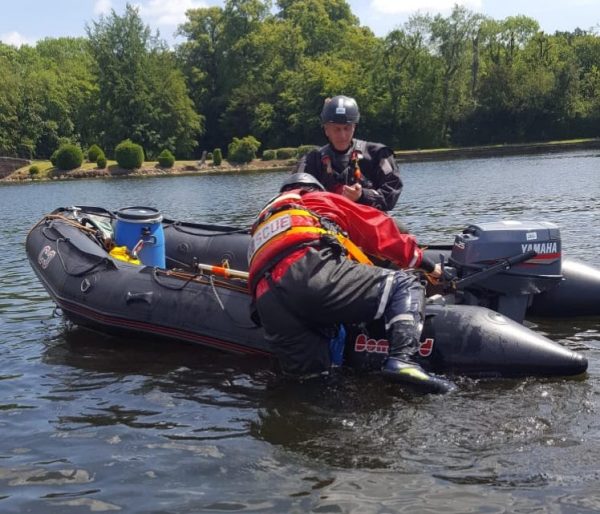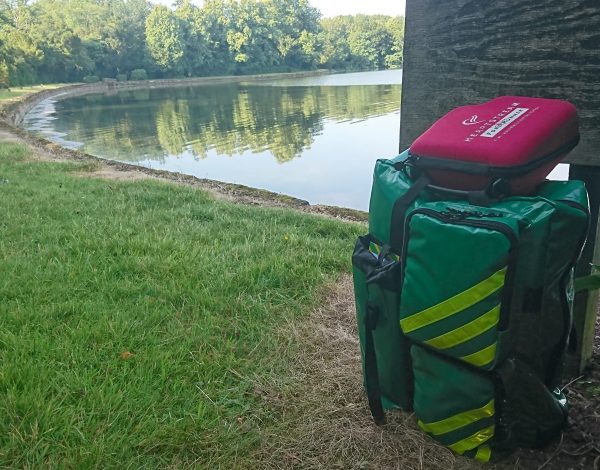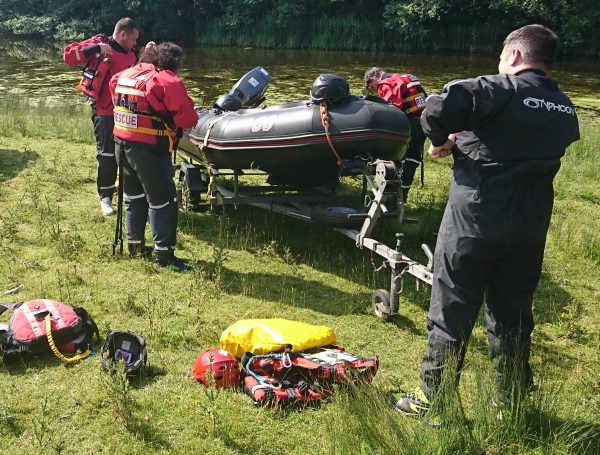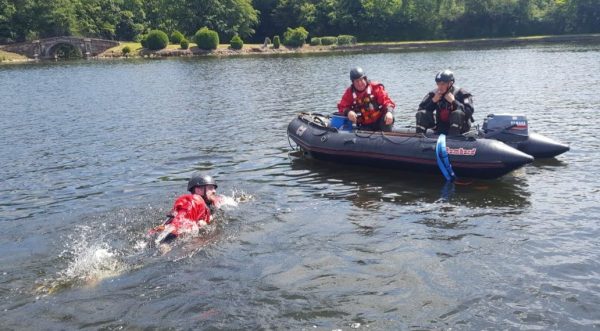Bridging the gap in training provision for rescue boats.
The ‘Inland Waters Rescue Boat Operator’ course is ideal for companies and organisations providing rescue vessels, whose operators will be working in daylight hours, predominantly in ‘land-locked’ Counties in particular those with a high density of navigable waterways.
Birmingham & Midland Marine Services developed the ‘Inland Waters Rescue Boat Operator’ qualification for boat operators providing safety cover for the civil engineering, construction, maintenance, utilities, rail and environmental sectors. The course does not cover tidal or estuarial waters.
The ‘IWRBO’ qualification sits at a higher level in terms of specialist rescue training than the RYA ‘Safety Boat’ qualification (which is designed for sailing clubs) and at a lower level than the DEFRA Module 4 ‘Powered Boat for Rescue Response’ or ‘Swiftwater & Flood Rescue Boat Operator’; predominantly designed for Emergency Services Water Rescue Professionals.
The IWRBO course provides a level of competency for safety & rescue boat operators and crews working in ‘inland’ open water environments such as canals, non-tidal rivers, reservoirs and lakes. This qualification would also be of benefit to Emergency Services Teams not requiring a DEFRA Module 4 qualification but having higher training requirements than a basic ‘leisure’ orientated course.
ENTRY REQUIREMENTS
Physically fit for this type of work, minimum RYA Powerboat Level 2 with a good degree of competency, accredited water safety awareness qualification (HSE / CDM Regs ’15 / DEFRA)
COURSE DURATION
2 days (RYAPBL2 + RYA IWHC / MCA BML holders)
2 days (RYA PBL2 holders)
ASSESSMENT/QUALIFICATION
Assessments to take the form of practical exercises.
CERTIFICATION
Certificates of attendance will be issued by Birmingham & Midland Marine Services and will be valid for 3 years from date of issue. Accreditation is being sought from the Institute of Search & Technical Rescue.
DELEGATE TO TUTOR RATIO
2:6 maximum.
Building upon the RYA Powerboat Level 2 qualification and looking at the limits and restrictions, procedures, processes and etiquette of Category ‘A’ & ‘B’ Waters, based upon the RYA Inland Waterways Helmsman Certificate syllabus.
As with the DEFRA Level 4 ‘Powered Boat for Rescue Response’ the entry requirement is an RYA Powerboat Level 2, differing in that holding a DEFRA Level 3 Water Rescue qualification is not a requirement.
Candidates must have undertaken some form of in-water, accredited water safety awareness and rescue at either HSE endorsed or CDM Regulations 2015 / DEFRA compliant level, be a competent swimmer in full aquatic PPE, being well practiced and competent at the helm of a tiller steer inflatable vessel.
2-day course: – those holding an additional RYA Inland Waterways Helmsman Certificate or Maritime & CoastGuard Agency BoatMaster’s Licence in addition to their RYA Powerboat Level 2 qualification.
The course is not residential (accommodation locally) and involves multiple site locations across the two- or three-day period. Transport available.
Full aquatic PPE is required for this course:
- Surface drysuit
- Water boots
- Approved water helmet
- Rescue buoyancy aid, (min 50N)
- Throwbag / throwline (min 15m)
- Lifejacket (min 150N, in service date with correct service markings – auto or manual).
Aquatic PPE is available from Birmingham & Midland Marine Services at £40.00 plus vat per day, per candidate. Please request this upon booking. Booking forms detailing your height / build / approximate weight and shoe size will be required no later than ten working days in advance of your course start date so that we can ensure we have your APPE size in stock.
Course duration and locations
RYA PBL2 Holders – 2 days.
Taking place at: Gailey Wharf, Staffs & Worcester Canal, Chillington Hall Estate, Trent and Mersey Canal and the River Trent.
RYA PBL2 & RYA IWHC /MCA BML Holders – 2 days.
Taking place at: Gailey Wharf, Chillington Hall Estate, Trent and Mersey Canal and the River Trent.
Syllabus
Inland Waters Rescue Boat Operator – inland waterways & open water by day.
- Introduction
- About the Course
- Course Aims
- Course Objectives
- The Nature of the Rescue Boat Environment and Operations
Boat Crew Roles
- General Considerations for Boat Crews
- Coxswain
- First Crew
- Second Crew
- Passengers
- Casualties or Survivors
Equipment
- Personal Protective Equipment (PPE)
- Team Equipment Considerations
Boat Operations
- General Considerations for Rescue Boat Operation
- Incident Report
- Risk Assessment
- Planning
- Still or Flat-Water Boat Operations
- Moving Water Boat Operations
Boat Skills and Manoeuvres
- Powerboat Level 2 Skills
- Moving Water Manoeuvres
- Holding Station by using Transits and a Head mark
- Ferry Gliding
- Approaching an Eddy Line from Downstream
- Approaching an Eddy Line from Upstream
- Person in Water – Upstream Pick Up
- Person in Water – Downstream Pick Up
Canal & River module
Theory
- Licencing – Vessel & Coxswain
- Insurance requirements
- Boat Safety Certificate requirements
- Engine suitability for inland waters
- Limitations and classifications of Category ‘A’ & ‘B’ Waters
- Navigation & Route Planning
Deck work
- Common nautical terms
- Handling warps and fenders
- Throwing a heaving line or coiled rope
- Knots; clove hitch, round turn and two half hitches, bowline.
- Securing to bollards, rings, cleats and mooring stakes
- Anchor work
Helmsmanship and Boat Handling
- Loading and weight distribution
- Steering on a river or canal
- Control of speed Inter-action and canal effect
- Turning Berthing and un-berthing alongside and between buoys
- Common steering & propulsion systems aboard inland based vessels
- Boarding inland based vessels from the rescue boat
- Use of paddles
- Running waves
Personal Safety
- Identification of risks, including cold shock
- Use of lifejackets and buoyancy aids
- Avoidance of personal injury, including crushing of limbs when fending off
Boat Safety
- Fire hazards, particularly petrol
- Use of fire extinguishers
- Watertight integrity
- Re-floating after grounding
- Welfare – Leptospirosis & other gastro-intestinal infections
- High risk areas on Category ‘A’ & ‘B’ waters
Locks
- General understanding of maintenance of levels
- Windlasses, anti-vandal and waterways keys
- Operation of locks
- Tending lines in locks
- Crushing, cills, protrusions, hanging, snagging
- Sharing locks
- Narrowbeam locks, Widebeam locks, River Locks, Stop locks & Guillotine locks
- Helical flow & control of effect
- Managing incidents at locks
Bridges and Tunnels
- General understanding of operation of bridges and use of tunnels
Collision avoidance
- Steering and sailing rules of the International Regulations for Preventing Collisions at Sea
- Bye-laws and local regulations including traffic signals, signs and priorities
- Awareness of other national and local regulations
- Publications to be carried
Care of the Environment
- Avoiding damage to boats, banks, flora and fauna
- Pollution avoidance & spillages
- Consideration for other water users
Casualty Handling and Management
- Introduction
- Pre-Planning for Rescue Boat Casualties
- Boat preparation for Casualty Handling
- Boat Handling Considerations
- The Conscious Casualty
- The Unconscious Casualty
- Typical Casualty Conditions
- Mass Evacuation
- References
Boat Based Searching
- Introduction
- Search Planning Overview
- Parallel Sweep Search
- Creep Line Search
- Expanding Square Search
- Searching in Restricted Waters
- Swiftwater Searches
- Working with Other Search Assets
Water Skills, Training and Team Typing
- Introduction
- Water Skills and Organisations
- DEFRA National Water Training Standards
- DEFRA Team Typing
Boat Equipment Lists
- Boat Equipment List
- Tender Maintenance Kit
